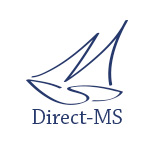Current Research
Direct-MS is currently funding a study which will test the effectiveness of a multi-component supplement for preventing and treating an animal-version of MS called EAE (experimental autoimmune encephalitis). This is a preliminary study to demonstrate the potential of such a therapy for MS.
It is expected the research will lead to clinical trials to determine the effectiveness of the supplement for treating persons with MS and preventing it in the first place. The results of this initial work will be available in late 2018. This research may well eventually result in an effective, low cost, side-effect-free treatment for MS.
Past Research
Over the past 12 years Direct-MS has funded a number of nutritional and CCSVI studies which were initially of no interest to mainstream MS charities. Notably, the success of these studies has resulted in the major MS charities changing their views and to their funding of research in these areas.
Nutrition
Vitamin D – From 2006 to 2008 Direct-MS funded a dose/safety study of vitamin D for persons with MS at the University of Toronto and St Michael’s Hospital. This was by far the most sophisticated MS/Vitamin D clinical trial ever done by that time. It was found that the escalating doses of vitamin D up to 40,000 IU/d had no adverse effects whatsoever.
The researchers also found that “A greater proportion of treatment patients had stable/improved disability scores vs. control patients (p=0.018). Treatment patients had fewer relapses and a greater reduction in relapse rate vs. controls. Finally, the laboratory studies demonstrated that high dose vitamin D resulted in much lower levels of immune cell expansion and that immune responses to myelin proteins were significantly reduced.
Most importantly, this study led to significantly more research on vitamin D and MS by major MS charities and insufficient vitamin D is now accepted as a causal factor in MS onset and progression. Notably, many neurologists are finally advising their MS patients to use adequate amounts of vitamin D.
Dietary Recommendations – Direct-MS funded a small clinical trial to test the effectiveness of our nutritional recommendations at the Ninewalls Hospital in Dundee Scotland from 2006 to 2008. It was found that, after one year, those on the recommended nutritional strategies had a lower rate of brain shrinkage and less change in disability scores as well as significantly better scores in MS Function Composite and Vision tests.
Terry Wahls Nutritional Recommendations – From 2010 to 2012, Direct-MS funded a clinical trial into the effectiveness of the Terry Wahls nutritional regime and electrical stimulation for advanced MS. It was found that nutritional strategies were of value for persons with progressive MS and this successful research has led to a much larger trial of the Wahls nutritional strategies being funded by the National Multiple Sclerosis Society.
CCSVI
In the summer of 2009, Direct-MS was the first MS charity to recognize that impaired blood flow from the brain (CCSVI) was likely involved in the MS disease process. Our advocacy efforts in the fall of 2009 led to widespread awareness of CCSVI by the MS patient population and to consequent pressure on the neurological community and MS charities to undertake proper research on this phenomenon. Notably, Direct-MS was the first MS charity to fund CCSVI and MS research.
In early 2010, Direct-MS funded CCSVI and MS association research at the University of Buffalo and this was very successful. It established beyond a reasonable doubt that CCSVI is highly associated with MS.
In 2010, Direct-MS also helped to fund the University of Buffalo PREMISE clinical trial which tested the effectiveness of CCSVI treatment for MS. The results from this very small trial were equivocal but our objective analysis of the results suggests that the restoration of proper blood flow from the brain may be of significant benefit.
Summary
Although Direct-MS is a very small charity with very limited funds, our targeted research efforts have had a major influence on the direction of MS research. Novel research funded by our charity has been the impetus for the large, mainstream MS charities to start to fund important research avenues such as vitamin D and nutritional strategies for treating MS.
We plan to continue to fund promising research topics not being addressed the major MS charities, but which are of great potential value for slowing or halting MS progression. The current research we are funding on the value of a multi-component supplement for MS is one more example of our efforts in this regard.

